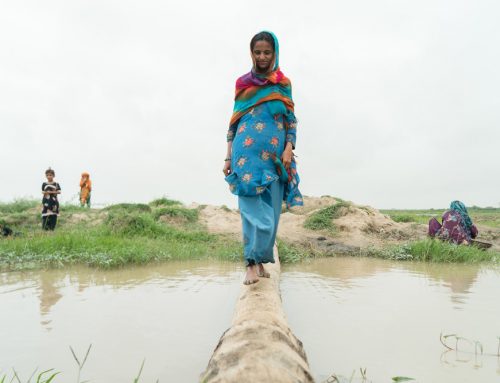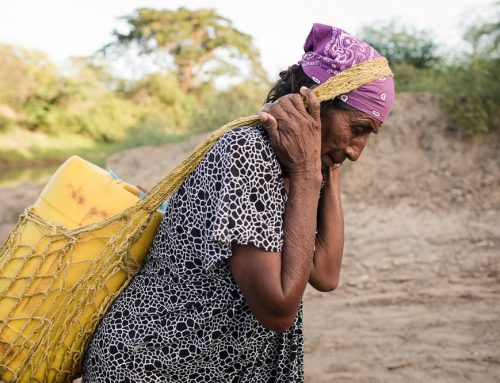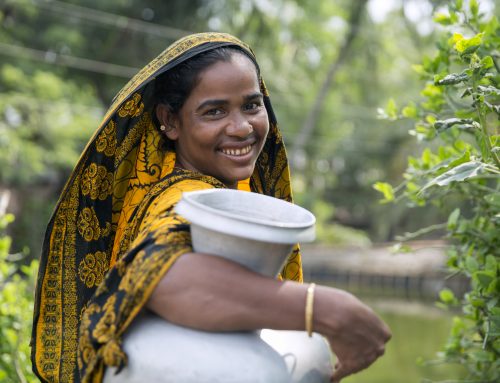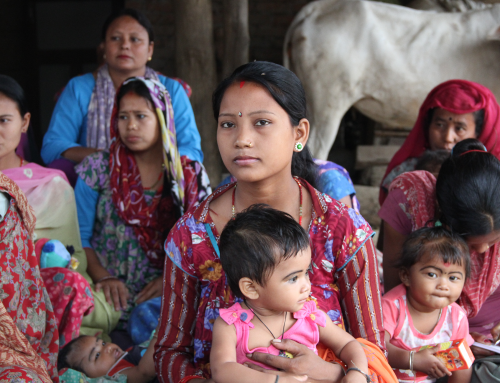In 1972 Barbara Frost left Keele University after two years studying psychology and social sciences, and went on what was intended to be a gap year. She took the so-called magic bus to Istanbul, continued by public transport on the hippy trail to India and Nepal, and ended up living in a commune in Australia. She didn’t come back to England for 24 years.
During that time she made rapid progress in public service jobs, developed homecare services in New South Wales and worked for Oxfam, Save the Children and ActionAid in Mozambique and Malawi. And when she finally returned to England in the mid-1990s it was to head the charity Action on Development and Disability – based, by coincidence, where she grew up, near Frome in Somerset.

Barbara’s journey to becoming WaterAid’s Chief Executive has taken her from Somerset to Mozambique. Photo credit: WaterAid
She’s now been chief executive for a decade of WaterAid, which works to provide water, sanitation and hygiene in 37 countries around the world. Since 2010 she has also led WaterAid International, the federation set up to coordinate the UK charity’s relations with WaterAids that have sprung up in the US, Canada, Australia, Sweden and India.
Meanwhile, honorary doctorates from Exeter and Cranfield Universities have taken the place of Frost’s unfinished degree, and she and the charity have won various awards; and while mud has recently been thrown at other big charities, WaterAid has stayed squeaky clean and managed to increase its income by £10 million to £84 million last year.
So what’s the secret of its success? One part of it, says Frost, is a strong, continuing connection to the water industry, the leaders of which founded the charity in 1981. The industry has a workforce that identifies strongly with the cause, includes appeal leaflets with people’s water bills and puts on events that raised more than £3 million last year.
Fundraising
Another part of the success is heavy investment in fundraising. The charity employs 100 fundraising staff and last year spent £16.5 million to raise £54 million, of which £48 million was from 331,000 regular givers. This means that 64 per cent of its total income is unrestricted, a proportion for which many charities would give an arm and a leg.
“It is a good return, but it also gives us a constituency, which means we’re not dependent on government funding or grants, which can change direction – water and sanitation might not be a priority for grant-makers in a particular year,” says Frost. “We want to keep that unrestricted percentage at about 65 per cent because it gives us a huge amount of strategic flexibility and a greater degree of certainty.
“We have a very diverse portfolio of income. We work a lot with communities, we do a huge amount of advertising to get public support and our database of supporters has increased to about 375,000 people who bring in not only financial support but also wider support, talking to MPs about what they’re doing and so on.”
The charity has also avoided some of the fundraising methods that have caused controversy recently: it has never swapped lists or done cold calling or cold mailing, for example, and in the street it has done only awareness-raising rather than soliciting direct debits, using in-house staff.
But it does telephone existing supporters to ask for upgrades, and formerly used the agency GoGen, which closed last July after allegations in the Daily Mail that it was exploiting loopholes in the Telephone Preference Service and for being, as the paper put it, “aggressive, ruthless and cynical”.
WaterAid immediately reviewed all its practices, put the telephone fundraising out to tender and drew up a shortlist of agencies, which Frost and her fundraising chiefs interviewed. “We looked at them for compliance, attitude, how they kept abreast of what was going on in the market, how they responded to the criticism and whether we felt they would deal with our supporters in the same way as we would directly,” she says.
The four that were chosen, which Frost declines to name while contracts are being finalised, are being required to work together “so they really understand, with us, what the culture of WaterAid is and how we want our supporters looked after. That’s been quite an interesting exercise because, rather than being transactional, it’s a partnership where they’re working together.”
Another result of the review of fundraising methods was a decision not to make follow-up telephone calls to people who made text donations to the charity’s recent Deliver Life campaign unless they had ticked an opt-in box. “We’re now trying to move gradually to providing all our supporters with the opportunity to opt in, but we want to do it in a way that fits in with their giving patterns.
“We think opt-in should be regular and unambiguous – all the words that are in the European legislation – but we don’t want to annoy our supporters by asking them to opt in when they have been supporting us for years and it would seem peculiar.”
Frost thinks the new Fundraising Regulator has an extremely difficult job, but says its interim chair, Lord Grade, is doing his best to listen to the sector about how it should work and guard against unintended consequences: “There needs to be good regulation, and we need to show good practice.”
A single-issue charity
Apart from its fundraising, another aspect of WaterAid’s success is its status as a single-issue charity operating in a relatively uncontroversial area. Other charities encounter criticism and are accused of being political because they try to change the way the world works; but who could possibly object to the mission of improving water, sanitation and hygiene?
“I agree, and that’s the beauty of running WaterAid,” says Frost. “It’s a single-focus organisation. No one denies everyone’s right to those things. In reality, of course, bringing about change in the countries where people are living without those services is highly political and requires the right political will and investments.
“But the advocacy that we do, which is about people’s rights to basic services, is of itself not political in the same way as other areas where NGOs are challenging what happens. So that gives us a great advantage – there’s no doubt about that.

Barbara visits a community in Bangladesh. Photo credit: WaterAid/ Abir Abdullah
“Having said that, all our work is about poverty eradication among the poorest people, and we know that all the other elements, such as livelihoods, social justice, women’s empowerment and girls’ rights, are equally important. So we work with others and with communities on those topics, all the while keeping our messages and our focus on water, sanitation and hygiene, which is what we’re here for.
“There have, in fact, been some great examples of communities that have been mobilised to take up the question of water and sanitation with their governments, but then, having found their power, move into other areas of their rights and take those forward. In Bangladesh, some of the women’s groups are very strong in this respect.”
Open season on charities
So why does Frost think the vogue has developed for criticising charities not only for fundraising, but also for pay and campaigning?
“I don’t entirely know, and I don’t think anybody does,” she says. “I think it’s a whole range of things. Some of the sector’s fundraising practices probably required looking at, and the way we look after our supporters. It’s partly the political climate as well. I suppose there’s more of a focus on value for money and results, which is not a bad thing, and we’ve got to get better as a sector at being able to show non-defensively how we are making this world a better place.”
Frost accepts that the Charity Commission, with its reduced resources, should confine itself to regulation while leaving the promotion of charities’ good work to the sector itself; and she thinks that the commission’s chair, William Shawcross, has been trying to be more positive about the sector.
And the mood music from the government? “I think it’s a pity that some pockets of poor practice have been picked up as if they’re the norm, and at times it’s felt that poor practice has dominated,” she says. “I hope that the pendulum will swing back the other way, because this society depends on an active voluntary sector and its support for the population.”
But the evidence from WaterAid’s recent fundraising campaign Deliver Life makes Frost feel that the mood of the British public might not be as negative as is sometimes suggested. Between November and February it raised nearly £5m, which will be partly matched by the government, for better sanitation in maternal health units. “We thought this would be a stretch, and it was,” she says. “But the giving was absolutely extraordinary. I think our experience shows that where there’s a clear focus for people’s generosity, and it’s clearly going to change lives, there’s a huge amount of public support out there.”
Leadership style
Another reason for WaterAid’s success, mentioned by others rather than Frost herself, is her low-profile style of leadership, perhaps produced partly by the early experience of cooperative living and learning to live and work amid an African civil war.
“I’m not into the cult of the chief executive,” she says. “I’ll go on stage at the UN or whatever when it’s needed, but I share it. There are lots of people with more authority than me in various ways, and I’m proud about others who speak for WaterAid.
“I don’t think incoming chief executives have to make their mark by changing things immediately. We have evolved as a charity – there have been no major restructures and we have tried things out and changed things gradually as we have gone along.”
This enabling approach is mirrored in the way WaterAid has operated since its foundation. About two-thirds of its current 800 or so staff are based outside the UK, and few of them are expatriates. It recruits its country leaders locally, and draws up agreements and specifications for local partners – which might be NGOs, local government,or the private sector – to implement projects.
“We see that as a sustainable approach, rather than doing things directly through our local offices. We try to see those we work with not as contractors but as partners, so we’re investing in their good governance, management, expertise, technical delivery and sometimes their policy advocacy work as well. It’s a process of empowerment and investment in shared outcomes rather than an approval process, which would feel like old-style development.”
Frost says it’s not always easy in developing countries to find people to fill key roles who show leadership, vision and a solid understanding of the local context, which will enable them to make investment decisions that yield the greatest benefits for the most people in the long run. “But when you get it right, things really fly,” she says. “I was in Bangladesh only a few weeks ago and that’s a country where things are really happening.”
This article first appeared in Third Sector magazine, and has been posted here with some minor edits.
Read the original article (paywall) >












